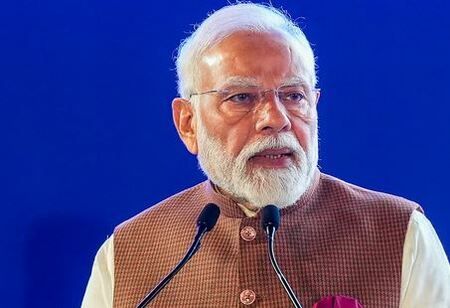
PM Modi Engages With Global Leaders on Pressing Issues at G7 Summit

 Prime Minister Narendra Modi arrived in Calgary, Canada to participate in the G7 Summit at Kananaskis to engage with global leaders on pressing matters such as energy security, technology, and innovation.
Prime Minister Narendra Modi arrived in Calgary, Canada to participate in the G7 Summit at Kananaskis to engage with global leaders on pressing matters such as energy security, technology, and innovation.
The summit is garnering significant attention given the ongoing Israel-Iran and Russia-Ukraine conflicts. Notably, Ukraine’s President Volodymyr Zelensky will also attend as a guest.
US President Donald Trump will leave the G7 summit in Canada a day early to address “important matters,” according to White House Press Secretary Karoline Leavitt, shortly after the President opted not to join efforts toward de-escalation and diplomatic talks between Iran and Israel.
PM Modi, who is on a tour of three nations, landed in Canada from Cyprus on Monday evening (local time) following an invitation from Canadian Prime Minister Mark Carney. The gathering in Kananaskis from June 16-17 marks Modi’s sixth consecutive appearance at the G7 Summit.
During the Summit, the Prime Minister is set to share insights with leaders from the G7 countries, other invited outreach nations, and heads of international organizations regarding vital global topics, including energy security and technology, especially concerning the AI-energy nexus and quantum issues, as stated earlier by the Ministry of External Affairs.
The Outreach Summit will focus on three main themes: “Protecting our communities globally,” “Building energy security and accelerating the digital transition,” and “securing future partnerships.”
This G7 summit will be Modi's first multilateral event following Operation Sindoor—India’s precise military actions against terror camps in Pakistan last month, which were initiated after a terror attack in Pahalgam that resulted in the deaths of 26 individuals, primarily tourists.
In addition to PM Carney, PM Modi is expected to hold discussions with several other leaders from the G7 and invited countries.
Carney's invitation to Modi underscores the new government's desire to mend relations with New Delhi, which had soured significantly over the killing of pro-Khalistani activist Hardeep Singh Nijjar.
Last October, India recalled its high commissioner along with five other diplomats after Ottawa sought to connect them to the Nijjar incident. India reciprocated by expelling an equivalent number of Canadian diplomats.
Carney, an economist and relatively new figure in politics, succeeded Trudeau as Canada’s new prime minister in March.
Following Trudeau's departure, New Delhi expressed hope for the restoration of ties with Canada based on "mutual trust and sensitivity."
Security officials from both India and Canada have recently resumed communications, and discussions are taking place regarding the appointment of new high commissioners.
On June 12, the Ministry of External Affairs announced that India is considering options to reset its relationship with Canada. The forthcoming discussions during the G7 Summit will provide a significant opportunity for India and Canada to exchange perspectives on bilateral and global issues, as noted by the foreign ministry.
Also Read: The Leadership of PM Modi and Indian Supremacy in Modern Warfare
During PM Modi’s previous visit in 2015, the bilateral relationship was upgraded to a strategic partnership.
The Group of Seven (G7) consists of an informal assembly of the world’s advanced economies—France, the US, the UK, Germany, Japan, Italy, Canada, and the European Union. Members convene annually at the G7 Summit to address global economic and geopolitical challenges.